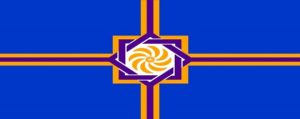
Appeal of the President of the Republic of Western Armenia (Armenia) in connection with the 45th anniversary of the occupation by the Republic of Turkey of the northern part of the Republic of Cyprus
JANUARY 11, 2020 – OFFICIAL – WESTERN ARMENIA.

APPEAL
of the President of the Republic of Western Armenia (Armenia) in connection with the 45th anniversary of the occupation by the Republic of Turkey of the northern part of the Republic of Cyprus,
as well as in connection with the invasion of the northern territories of the Syrian Arab Republic, with the 99th anniversary of the occupation of the territories of Western Armenia and Cilicia and other crimes against the peoples and states of the Greater Middle East
The current neo-Ottoman policy of the Republic of Turkey is essentially a repetition of the policies of the Ottoman Empire and the Republic of Turkey in the period 1894-1923, which is extremely dangerous and poses threats both to the peoples living in the Republic of Turkey and to countries and peoples of the Middle East region.
The Ottoman Empire is known in history as a general prison of peoples. For centuries, the Ottoman Empire impeded freedom, the possibility for civilizational development and the natural rights of the peoples living on the territory of the Empire. This led to the Genocide and deportation of non-Turkic peoples living in the Empire, primarily Christians. In the years 1916-1923 the Greeks suffered Genocide and forcible resettlement, in 1914-1923. — Assyrians, and during the years 1894-1923 — Armenians. As a result of the lasting 30 years, from the end of the 19th and the beginning of the 20th centuries, the greatest crime committed by three alternating Turkish governments — the Sultan, Young Turkish and Kemalist, more than 1.5 million Armenians living in their historical Homeland — on the Armenian Highlands, where for many thousands of years their ancestors lived. About the same number of Armenians were deported and exiled, and hundreds of thousands, including women and children, were forcibly Islamized.
The governments of Great Britain, France and Russia were the first to condemn the Armenian Genocide in their joint statement of May 24, 1915 qualifying the actions of the Turkish government against Armenians as “a new crime of Turkey against humanity and civilization”.
We also consider it necessary to state that for more than a hundred years the Turkish state, with successive governments, has continued to implement a policy of genocide and state terrorism against citizens of the state, the indigenous peoples of the region of Greek, Armenian and Assyrian origin. And from the late 1920s, a similar policy has also been pursued with regard to Kurds and Yezidis. Thus, with regard to the indigenous peoples of the Greater Middle East, a genocidal policy of persecution, extermination and deportation continues, forcing them to leave their places of residence.
The Republic of Turkey, being the successor of the Ottoman Empire, unfortunately, completely inherited the basic features and methods of the Empire as a terrorist state.
Often with the connivance or with the tacit consent of the international community, the Republic of Turkey pursues an aggressive policy towards the peoples and states of the Greater Middle East.
In 1974, the Armed forces of the Republic of Turkey invaded the northern regions of the Republic of Cyprus, repeating the story of the killings, destruction and deportations of the Greeks and Armenians. These territories are still occupied by the Republic of Turkey.
Terrorist groups operating in the Middle East undergo military training, arm and group in the Republic of Turkey, and then invade Syria.
The armed forces of the Republic of Turkey, with false slogans of peace, are invading the northern regions of the Syrian Arab Republic and it is not known how long this new occupation will last.
Currently, Turkey is preparing to invade Libya, citing some prepositions and referring to some agreement.
These are new threats and challenges directed by the Republic of Turkey against the peoples and states of the region.
That is why the Republic of Western Armenia (Armenia) calls on the Armenian, Greek and Assyrian peoples, as well as other peoples of the Greater Middle East and the Balkans, to establish strategic cooperation in order to restore and ensure the rights of our peoples based on historical justice and international law.
- We consider it our duty, finally, to realize the rights granted to our peoples, and indicated in international treaties and conventions, but not implemented.
- UN Resolutions 541 and 550, addressed to the states of the world, on the non-recognition of the state formation of Northern Cyprus as Turkey’s annexed northern part of the Republic of Cyprus in 1974.
- The Versailles system of international treaties 1919-1920 based on the results of the First World War, stated Turkey’s obligations to the countries of the Greater Middle East, the Balkans, the Mediterranean and the Black Sea basins, which were fixed in 1920 by the Sevres Peace Treaty, as one of the fundamental and key treaties of the Versailles system of international treaties.
- The Decree of the Government of Russia (Council of People’s Commissars of Russia) “On Turkish Armenia” (“On Western Armenia”), dated January 11, 1918.
- The Arbitral award of November 22, 1920, by the 28th US President Woodrow Wilson on behalf of the League of Nations on the establishment of the state border between Turkey and Armenia.
- The Sevres Peace Treaty regarding autonomy for Kurdistan and the possibility of further independence (in accordance with the provisions of Articles 62, 63, 64).
Recall also that in the Statement of the State Duma of the Federal Assembly of the Russian Federation dated April 14, 1995 “On the condemnation of the Armenian Genocide in 1915-1922” it was noted: “The State Duma of the Federal Assembly of the Russian Federation, based on irrefutable historical facts testifying to the extermination of Armenians on the territory of Western Armenia in 1915-1922, following the spirit and letter of the Convention on the Prevention and Punishment of the Crime of Genocide adopted by the United Nations of December 9, 1948 and the Convention and “On the Inapplicability of the Statute of Limitations to War Crimes and Crimes against Humanity” of November 26, 1968, striving to revive the humanistic traditions of the Russian state, recalling that, at the initiative of Russia, the great European powers qualified back in 1915 the actions of the Turkish Empire with regard to the Armenian people as a «crime against humanity», noting that the physical destruction of the brotherly Armenian people in their historical Homeland was committed in order to create conditions for the destruction of Russia, condemns the organizers of the extermination of Armenians in 1915-1922, expresses its sympathy to the Armenian people and considers April 24 as a day of remembrance of the victims of Genocide.»
The Resolution of the House of Representatives of the US Congress of October 29, 2019 and the Resolution of the US Senate of December 12, 2019 “Confirmation of the US Position on the Recognition of the Armenian Genocide by Turkey” notes:
“Expressing the sense of the Senate that it is the policy of the United States to commemorate the Armenian Genocide through official recognition and remembrance.
Whereas the United States has a proud history of recognizing and condemning the Armenian Genocide, the killing of an estimated 1,500,000 Armenians by the Ottoman Empire from 1915 to 1923, and providing relief to the survivors of the campaign of genocide against Armenians, Greeks, Assyrians, Chaldeans, Syriacs, Arameans, Maronites, and other Christians.»
On March 25, 2019, the UN demanded reliable information from the Republic of Turkey about the fate of forcibly deported Armenians during the 1915-1923 Genocide.
The request says:
“1. Please provide any information and/or comment(s) you may have on the allegations: …violations attributable to Turkey in relation to the tragic events that affected the Armenian minority from 1915 to 1923, and their consequences for the population concerned.
- What policies have been put in place by your Excellency’s Government to respond to these allegations?
- What measures has Turkey taken to establish the facts, including the fate or whereabouts of Armenians who were subjected to forced internal displacement, detention, extrajudicial killings and enforced disappearances during the period of 1915-1923?
- What measures have been taken to ensure the right of victims and of society as a whole to know the truth about these events, and to ensure the right of victims to justice and reparations for the damage suffered?
- What measures have been taken to locate, insofar as possible, the bodies of Armenians who died as a result of these events?
- Please provide information about the reasons for the adoption of the 2017 legislation preventing lawmakers from making certain expressions. Please explain how this is compatible with international human rights law, in particular with article 19 of the International Covenant on Civil and Political Rights.
- Please provide detailed information about the cases in which Article 301 of the Criminal Code has been applied to punish individuals for statements made alleging crimes against Armenians.”
The impunity of the Turkish government for the occupation of the northern part of the Republic of Cyprus in 1974 led to the fact that the current leadership of the Republic of Turkey continues to cynically trample on all the rules of international law.
Only through joint actions and efforts can we put an end to state terrorism of the Republic of Turkey directed against the peoples and states of the Greater Middle East, the Balkans, the Mediterranean and the Black Sea basins.
We are convinced that the international community, represented by the United Nations, must make every effort to ensure the fundamental rights of the peoples of the region for life, development and the future.
Radik Khamoyan
President of the Republic of Western Armenia (Armenia)
January 11, 2020

